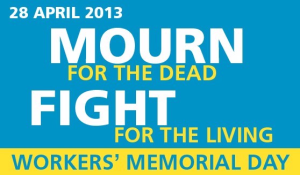WMD – There’s no such thing as a free lunch
On Workers Memorial Day it is important that we ask “Why is it so important that we mourn for the dead and fight for the living?”
The collapse of RanaPlaza, an eight-storey building which housed five garment factories, is not the first incident of its kind. Back in 2005, a similar building collapsed in the same town, leaving 64 garments workers dead. The owner of that factory was arrested but did not serve a single day in custody.
Since 2005, there have been fires, stampedes and other incidents at various garment factories, resulting in hundreds of deaths. Most recently, over 100 workers perished in a fire at Tazreen Fashions in Ashulia, a township close to Dhaka where hundreds of similar factories are, many producing low cost garments for the international market.
In most of the incidents, the deaths were preventable. Often, workers could not escape because exits were locked.
This week the House of Lords voted to change the law so that in future, even though an employer may have breached health and safety regulations specifically designed to protect workers, the injured worker cannot rely on that breach as evidence of negligence in any claim for compensation.
The government amended the Enterprise and Regulatory Reform Bill without consultation and after the Bill had been through committee in the House of Commons. This means that the burden of proving what caused an accident will now fall on the injured worker or the family of someone killed, rather than the employer.
In future the worker will have to prove what the employer knew or ought to have known about, for example, a machine being faulty, a substance or practice being hazardous or a leaking roof causing a slip hazard, if they are to recover compensation.
Alarm bells should be ringing further still throughout the Trade Union movement in response to the governments announcement that it will review the Health and Safety Executive to see if its “functions are still needed.”
The TUC points out that far from being over the top, inadequate legal requirements had failed to prevent tragedies such as the drowning of the MorecambeBay cockle pickers or the sinking of the Herald of Free Enterprise at Zeebrugge.
The Government has already abolished official spot-check inspections in “low risk” areas, such as docks, agriculture, quarries and retail. Workers die far too often in these three categories and physical and verbal attacks against shop workers has become far too prevalent to be disregarded. And the number of health inspectors has been cut to dangerous levels, leading inexorably to reduced incidence of safety inspections.
At the same time, the government has unleashed its most effective tool, the Media, often reporting on the basis of falsified information, to dress up workers’ concerns for their well-being at work as “health and safety gone mad.”
An attack upon one workers Health and Safety is an attack upon all workers Health and Safety as the true financial and emotional costs of a workplace incident are paid by the community at large, not by the negligent employer.
Mourn for the dead and fight for the living

